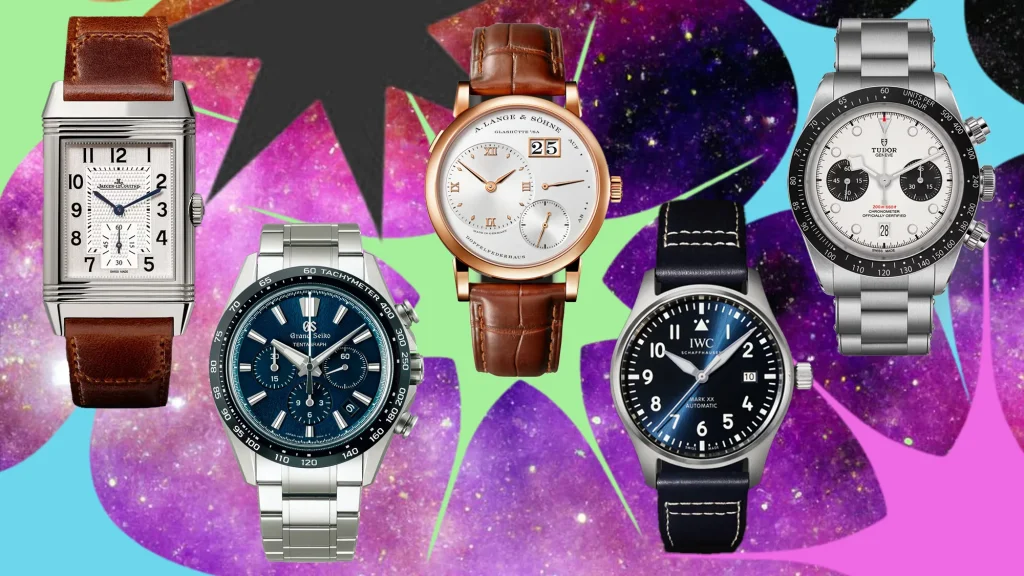Blog
“Watches That Tell a Story: Heritage Timepieces to Own”
In the world of horology, some watches transcend their function as timekeepers to become storytellers. These heritage timepieces capture the essence of history, innovation, and human achievement, each with a unique narrative that connects the wearer to moments of cultural, scientific, or personal significance.
This article explores some of the most compelling heritage watches you can own—timepieces that carry stories worth telling.
What Are Heritage Watches?
Heritage watches are models with historical significance or designs inspired by the past. They often celebrate milestones in watchmaking, honor cultural icons, or reflect pivotal moments in history. Owning a heritage timepiece is not just about possessing a watch but about holding a piece of the past, rich with meaning and tradition.
Why Heritage Watches Matter
1. Historical Significance
Many heritage watches are tied to landmark events, such as space exploration, military missions, or cultural revolutions. These timepieces become timeless symbols of human endeavor and resilience.
2. Exceptional Craftsmanship
Heritage watches are often crafted with meticulous attention to detail, embodying the artistry and innovation of their era.
3. Emotional Connection
The stories behind these watches create an emotional bond with the wearer, making them more than just accessories.
Iconic Heritage Watches to Own
1. Rolex GMT-Master
The Traveler’s Watch
Launched in 1954, the Rolex GMT-Master was designed for Pan Am pilots to track two time zones simultaneously. It quickly became a favorite among globetrotters and adventurers.
Why It’s Special:
- The bi-color bezel, known as the “Pepsi” or “Batman” depending on its color scheme, is instantly recognizable.
- Its association with aviation history makes it a must-have for travel enthusiasts.
2. Omega Speedmaster Professional (Moonwatch)
The First Watch on the Moon
Few watches have a story as iconic as the Omega Speedmaster. Selected by NASA for the Apollo missions, it became the first watch worn on the moon during the Apollo 11 landing in 1969.
![]()
Why It’s Special:
- Its robust design passed NASA’s rigorous testing.
- The Moonwatch connects its wearer to the golden age of space exploration.
3. Cartier Santos
The First Pilot’s Watch
Created in 1904 for aviator Alberto Santos-Dumont, the Cartier Santos was one of the first wristwatches designed for practical use. Its rectangular case and visible screws were groundbreaking at the time.
Why It’s Special:
- The Santos is a symbol of innovation and elegance.
- Its connection to aviation pioneer Santos-Dumont makes it a piece of history.
4. Jaeger-LeCoultre Reverso
A Watch with Two Faces
The Reverso was invented in 1931 for polo players who needed to protect their watch crystals during matches. Its reversible case is both functional and stylish, making it a design icon.
Why It’s Special:
- Its Art Deco aesthetic is timeless.
- The reversible case offers a unique customization opportunity.
5. Patek Philippe Nautilus
The Luxury Sports Watch
Introduced in 1976, the Nautilus was designed by Gérald Genta as a bold, steel luxury sports watch. Its porthole-inspired design and integrated bracelet set it apart from traditional dress watches.
Why It’s Special:
- It redefined luxury watches by making stainless steel desirable.
- The Nautilus is a symbol of sophisticated leisure.
6. Seiko 6105 “Captain Willard”
The Diver’s Companion
Popularized by Martin Sheen’s character in Apocalypse Now, the Seiko 6105 became known as the “Captain Willard.” This rugged dive watch was favored by soldiers during the Vietnam War.
Why It’s Special:
- Its durability and design are legendary among divers and military personnel.
- It represents resilience and survival during challenging times.
7. Audemars Piguet Royal Oak
The Game-Changer
Launched in 1972, the Royal Oak revolutionized watchmaking as the first luxury sports watch made from stainless steel. Its octagonal bezel and integrated bracelet, designed by Gérald Genta, challenged conventions and became an instant icon.
Why It’s Special:
- It’s a pioneer in the luxury sports watch category.
- The Royal Oak’s bold design remains as relevant today as it was in the 1970s.
The Emotional Value of Heritage Watches
What makes heritage watches so special is the emotional connection they create. Wearing a Speedmaster Moonwatch isn’t just about telling time; it’s about carrying a piece of the Apollo missions on your wrist. Owning a Reverso isn’t just about style; it’s about celebrating a time when form and function came together to solve a unique problem.
These watches become personal artifacts, often passed down through generations, transforming into heirlooms with their own family stories to tell.

How to Choose a Heritage Watch
When selecting a heritage watch, consider the following:
- The Story:
Choose a watch with a story that resonates with you. Whether it’s tied to exploration, innovation, or a cultural milestone, the narrative should inspire you. - Craftsmanship:
Look for brands known for their quality and attention to detail. Heritage watches often showcase exceptional craftsmanship that stands the test of time. - Versatility:
A heritage watch should complement your personal style and suit a variety of occasions. - Investment Value:
While the emotional connection is paramount, heritage watches from reputable brands often appreciate in value over time.
Why Every Collector Should Own a Heritage Watch
Heritage watches are not just timepieces; they’re a gateway to history, culture, and innovation. For collectors, they represent the intersection of art and engineering. For enthusiasts, they offer a tangible connection to the past.
Whether you’re drawn to the adventurous spirit of the Rolex GMT-Master, the celestial legacy of the Omega Speedmaster, or the bold design of the Royal Oak, these timepieces are more than accessories—they’re stories you can wear on your wrist.
Investing in a heritage watch means owning a piece of history, a testament to human ingenuity and timeless design. As you build your collection, let these iconic watches remind you of the stories they tell and the legacy they carry forward.

